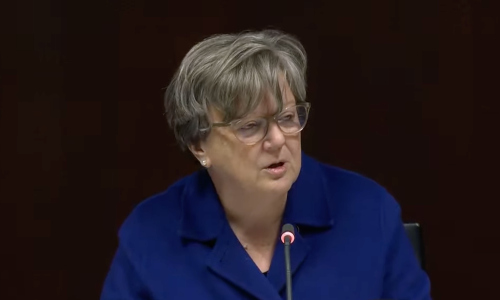CS-PUK Criticizes Lack of Early Crisis Detection
The report presented by the Parliamentary Investigation Commission on Friday regarding the downfall of Credit Suisse outlines several demands and areas for reform.
It was a highly anticipated document. On Friday, the Parliamentary Investigation Commission (PUK), chaired by President Isabelle Chassot (Center Party; see image below), presented its report on the collapse of Credit Suisse (CS).
The 14-member commission unanimously concluded in its report that the use of emergency powers by the authorities was lawful.

(Image: youtube.com)
However, the report also lists failures and opportunities for improvement. The cooperation between authorities did not always function optimally. The commission calls for improvements in information sharing, risk management, and early crisis detection.
Questions About Finma's Effectiveness
The authorities' intervention in March 2023 is credited with preventing a global financial crisis.
The Financial Market Supervisory Authority (Finma) did carry out intensive supervisory activities, but these had only limited effectiveness. Despite numerous enforcement proceedings and corresponding warnings from Finma, scandal after scandal unfolded at CS. The Federal Council acted too hesitantly in introducing the Public Liquidity Backstop (PLB).
The crisis was clearly caused by the management and board of directors of CS. However, it was not the PUK's role to assess the management itself.
Criticism of Maurer
The behavior of Ueli Maurer, who stepped down as Finance Minister at the end of 2022, also came under scrutiny. It is deemed incomprehensible that he only verbally informed the Federal Council and refrained from using written documents.
Maurer shared very little information with the Federal Council, thereby failing to fully meet his legal obligation to provide information. Furthermore, when handing over his department to current Finance Minister Karin Keller-Sutter, he did not sufficiently inform his successor about the CS dossier.
The PUK also criticized the federal government for lacking early crisis detection mechanisms.
Focus on Key Institutions
The PUK's work primarily centered on the Federal Council and the Federal Department of Finance (FDF), as well as Finma, the Swiss National Bank, and the Federal Audit Oversight Authority.
The 500-page report calls for an internationally oriented «Too Big to Fail» (TBTF) regulation. Switzerland now has only one major bank.
«UBS, as the only remaining G-SIB (Globally Systemically Important Bank) in Switzerland, is several times larger relative to the national GDP than other financial institutions in relation to the GDP of their respective countries. The PUK therefore considers it essential to appropriately reflect this circumstance in regulation,» the report states.
Sufficient capital resources for banks are deemed mandatory, and the possibility of obtaining regulatory relief must be restricted.
18 Months of Work – Nearly 80 Hearings
The Parliamentary Investigation Commission (PUK) was established in June 2023. It consists of 14 members, seven each from the National Council and the Council of States. Isabelle Chassot (59, Center Party) was appointed as PUK president. Members include National Councilor Thomas Matter (SVP, Zurich), Councilor of States Daniel Jositsch (SP, Zurich), and National Councilor Daniela Schneeberger (FDP, Basel-Land).
The mandate was to examine the actions of the authorities in the context of the emergency merger of Credit Suisse with UBS in March 2023.
The information-gathering phase was completed in May 2024, during which nearly 80 hearings were conducted with representatives from the government, authorities, and banks.



























